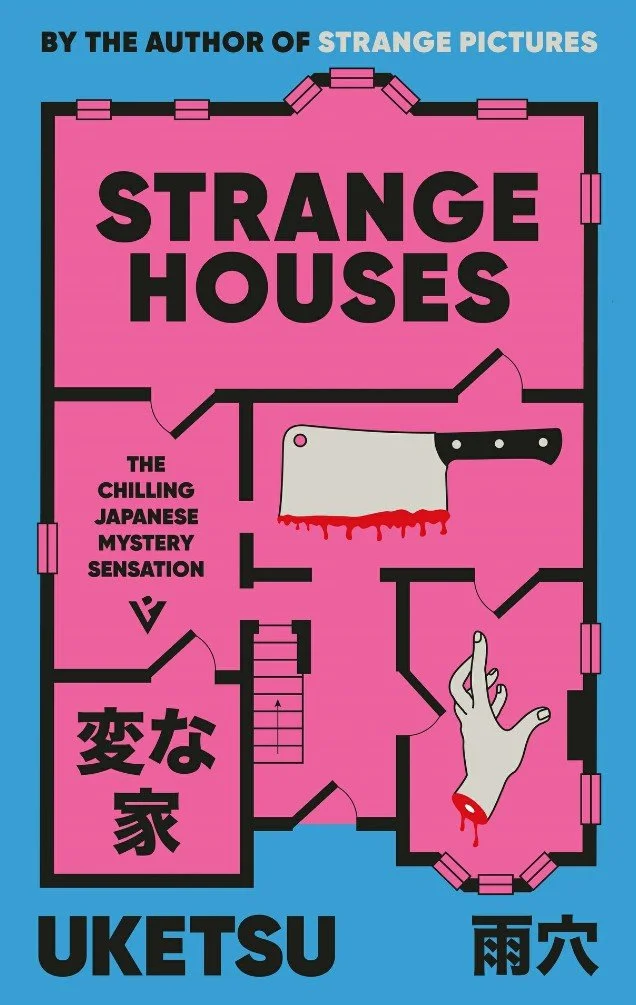A while back I talked about Strange Pictures, a book written by a Japanese youtuber who apparently has a sizeable following, during one of my preview posts. I didn’t end up reviewing it for the blog, but I did actually read it shortly after it came out.
Strange Pictures presents itself as consisting of four short stories, each revolving around a character trying to decipher the mystery of some titularly strange pictures. It pretty soon becomes apparent that the stories are actually telling one interlinked story, with subsequent chapters filling in blanks or unanswered questions from previous ones. My big issue with the book is that while the individual chapters are intriguing and sometimes genuinely eerie, combining them into an ongoing story robs them of a lot of what makes them interesting. In addition, the overall plot of the combined story just wasn’t very interesting.
Still, I was intrigued enough by the concept to still give Uketsu’s follow up a try, mostly because I find the concept of “strange houses” inherently intriguing.
The houses that are strange come to the attention of the book’s narrator—Uketsu himself, or at least his fictional alter ego—via a friend who’s considering buying a house and has noticed something odd about the house’s floor plan: a small, sealed-off space in the kitchen. Uketsu brings the plans to an architect, who noticed even stranger features of the house, like the upstairs child’s bedroom with no windows, and between the two of them they hatch a fanciful explanation involving a secret child and a family of murderers. Or maybe not so fanciful, once a dismembered body turns up in the forested hillside near the house.
One of the issues I had with Strange Pictures was that it felt more like reading a description of someone solving an ARG or an adventure game puzzle than an actual novel, and I kept wishing I was just solving the puzzle myself. I guess that would technically be possible, but it wouldn’t be particularly enjoyable given that the mysteries in that book involved a lot of rotating, layering and examining drawn images. You could, I guess, scan the images or print off screenshots from the Kindle version and try it out for yourself, but even if you went to that much effort you’d still have the issue that your copy of the pictures were black and white, whereas the ones in the story are meant to have colour. (And if I remember correctly, at least one of the solutions relied on the physical properties of the medium used in the drawing, which obviously couldn’t be reproduced at home). Thus, the story felt ill-suited to the format it was being told in.
Here, all of the non-textual elements are monochromatic floor plans, so the disconnect between what the characters are meant to be seeing and what you, the reader, is seeing is greatly lessened. This helps the book go down easier, but it doesn’t solve the larger problem that you’re still reading about people sitting around coming up with theories about a mystery, as opposed to actually going out and solving a mystery.
In fact, the resolution of the mystery has nothing at all to do with any of the characters’ actions; the truth comes out because someone else involved decided to spill the beans of the their own volition in the form of a massive multi-generational info-dump, so the book goes from being about people discussing a mystery that’s happening “off-screen” to people discussing a story that already happened off-screen.
Much moreso than in Strange Pictures, this whole book ends up feeling like a skeleton outline of a plot rather than an actual plot, all in service of making the “looking at floorplans” gimmick an integral part of the story. And while that gimmick is pretty novel, I don’t think it justifies sacrificing the actual plot of the book (which comes across as kind of silly as told here, but might have had potential in a more traditional format) in order to maintain.
As interesting as I find Uketsu’s experiments, I just don’t think they’re suited to being published as books. They’d work much better as blog-based ARGs where information could be presented to the reader more naturally, and where links to other forms of media like fake news articles would eliminate the need to have characters spill their deeply-held secrets for the sake of moving the story along.
